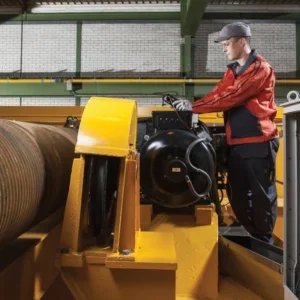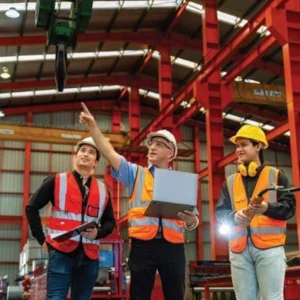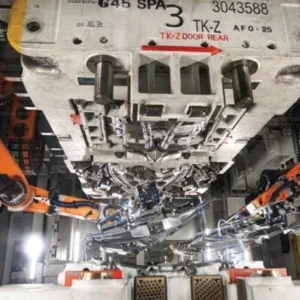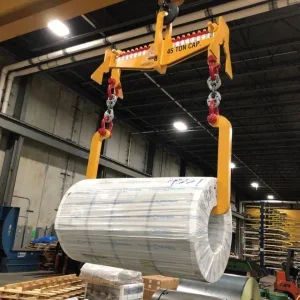Engineering is probably more open to women today than at any time in the past. “The thing is not being male or female, but the qualities and commitment of the person,”said GHcrane designer Miren Guerra, echoing the sentiments of many today.
Women are seen as equals by an increasing number of men. Indeed, some go further, believing that lifting organisations gain real business benefits from employing women in technical positions because they draw on a range of skills and attributes lacking in many men.
However, this positive view of women in engineering has not always been so widespread. “When I first got into the industry myself 20-plus years ago I wanted to be a draughtsperson or an engineer. At that time the field wasn’t open for women, so I went into estimating and purchasing,” says Wanda Smith, senior buyer at US special crane firm Whiting. “It is more accepted today that women can understand mechanical things than in the past,” she says.
None of the women I spoke to for this article reported being bullied, discriminated against, or harassed. But that does not mean they did not encounter sexism or experience the negative effects of a male-domniated work place.
“You have to have a thick skin,” says Kathy Keevin, materials manager at Whiting. She originally followed relatives working at the company and rose through the ranks from the position of clerk. “You have to be willing to work alongside men. But once you prove yourself to them, they will help you with anything,” she says.
Some women have turned male curiosity about female engineers into an advantage.
“I found when I was visiting a customer, I would get a foot in the door because they were curious. I never used it, but it helped me get appointments,” says Nancy Doran, sales engineer for the USA’s R&M Materials Handling. “Their first questions were ‘What’s your background?’ And I’d say I studied at Georgia Tech, which is a good school, and that I am an engineer, and then they would say, ‘OK, maybe we can chat.’ I was more amused than anything if I felt I was being tested. I’m not afraid of a challenge.”
Someone else willing to rise to a challenge is Jeni Conner, who works in project management and sales at Reading Crane & Engineering. She says the gender imbalance “just makes things interesting sometimes. Men do not expect someone like me to know what I’m talking about. It’s kind of shocking for them. That’s a positive thing. People want to see me. They want to give me work, and have me come around – that is my advantage. There are some down sides, but for the most part there’s an advantage for an attractive woman coming in and climbing on to a crane, knowing what she’s talking about. I think that intrigues men.”
Others though disagree. “I don’t know if there is any advantage to being a woman,” says Kerry Biggs, Whiting parts sales customer response manager. “Some of the male male reps think that if customers are calling me back it’s because they want to talk to a pretty voice. But they say it in jest,” she says. “Customers are looking for an answer rather than a man or a woman. There is not a lot of time for pleasantries.”
Some of the women I encountered seemed to be attracted to the crane business precisely because it is overwhelmingly male.
Johanna Oksanen, electrotechnical support engineer for German hoist and crane builder SWF of Germany, was one. “I find my character is more geared to working around men,” she says. “I couldn’t imagine myself in a hospital surrounded by women nurses, for example. Sometimes I prefer the straight-talking way men behave.”
The male/female ratio can be seen as something of a barrier to women, according to R&M’s Nancy Doran. “It does take something for women to go completely into a man’s world and feel comfortable walking the walk and talking the talk,” she says.
“My hope is that I can give that little bit of encouragement to women going down that path. Unless a girl has encouragement, the way society is, she will hesitate and feel intimidated. Some girls may want to be tested, but those on the borderline might not choose to go down that road.”
A different outlook
Most of the women I spoke to believed that females were especially good at taking care of details. “That helps a lot in engineering: you have to make sure that you go over all the different bits and pieces, and ensure everything works,” says Whiting product engineer Danielle Carroll.
“Women are traditionally able to multitask better, and are more sympathetic to customer’s needs,” adds Doran. “It’s a female trait to nurture and take care of people, and you can apply that to a customer/vendor relationship.”
Being a successful sales engineer – male or female – is about combining soft and analytical skills, Doran says. “I don’t want to say that engineers are all a bunch of nerds stuck in their rooms with their computers, but a lot of them can’t relate to people. An engineer who can talk about technological needs but also cultivate relationships is an asset to a company. A lot of sales come from relationships.”
Women may have the edge there, Doran believes. “Women are more conversational, and that helps us ask the right questions when customers tell us their needs. Women are able to draw people out a bit more.”
The presence of women changes the way men work, says Oksanen of SWF. “When there are women, it somehow has an influence on the thinking of men and their work practices. Women bring their own ideas and a different kind of approach. Usually men behave differently when women are around.”
Whiting materials manager Kathy Keevin points out what she shares with her male colleagues is a culture of cooperation. “Physically I’m not as strong as a man,” she says. “Sometimes there are heavy parts that come in that I can’t lift. I have to either ask for a forklift, or ask a guy to move that part.”
Having to ask for help does not bother her. “No one person knows or can do everything. That is one of the keys to success for women at Whiting: we don’t have all of the answers and we don’t have, perhaps because of our background, the edges that men may have had. We are willing to work together as a group to find the answer. We’re not going to let anything stop us.”






